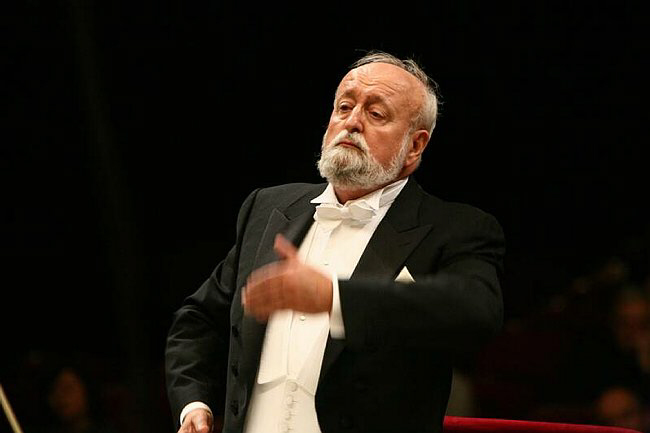 |
Krzysztof Penderecki. (OPUS) |
Krzysztof Penderecki, one of the greatest classical music composers of our time, is visiting Seoul next week to present his contemporary musical.
Honoring his 80th birthday, the Seoul International Music Festival “Winter,” to be held Dec. 16-20 at Seoul Arts Center, will be dedicated to the Polish composer, who has had a long relationship with Korea.
On Dec. 16, the Shanghai Quartet will perform Penderecki’s String Quartet No. 3 along with Haydn’s String Quartet in D minor, Op. 76, and Dvorak’s String Quartet No.14 in A flat major, Op. 105, at the IBK Chamber Hall. The next day, Ensemble Opus, composed of violinists Baek Ju-young and Cho Ah-ra, violist Lee Hwa-yoon, cellist Arto Noras, clarinetist Kim Han, pianists Park Jong-hwa and Grace Yeo, as well as horn player Kim Young-yul, will perform Penderecki’s Sextet, followed by Shin Jee-soo’s Piano Quartet and Brahms’ Piano Quartet No.3 in C minor, Op. 60.
Dec. 18 will be the night of “Master and Apprentice #1,” during which the Korean Chamber Orchestra will perform Penderecki’s Violin Concerto No. 2. The chamber orchestra will also play Cello Concerto No. 2 by Ryu Jae-joon, a renowned composer who studied under Penderecki at the Krakow Music Academy. The following day, at “Master and Apprentice #2,” acclaimed conductor Piotr Borkowski will lead the orchestra for the Asian premiere of the master composer’s Suite per Violoncello Solo and Violin Sonata No. 2, followed by Ryu’s Sonata for Clarinet and Piano.
On the final day, at the SAC’s Concert Hall, the 80-year-old will take the baton of the KBS Symphony Orchestra for the Korean premiere of his iconic piece “Seven Gates of Jerusalem.” The orchestra will be joined by the National Chorus of Korea and the Seoul Metropolitan Chorus.
“Penderecki has been called the ‘living legend’ for his music encompassing deep and philosophical issues of life, death, and good and evil,” said Allie Ko, spokeswoman of OPUS, the organizer of the festival.
“He uses new and old musical instruments; he experiments with different melody lines and rhythms in the same piece. And his world has remained undefined ― he is considered very classical but at the same time post-modern.
“He is known for putting a lot of time and effort into his work ― for example, his Suite per Violoncello Solo was written over a period of 20 years,” she added.
The Grammy winner in classical music has maintained close relations with Korea. He received an honorary doctorate from Seoul National University. And in 1991, he wrote and premiered a work commissioned by the Korean government, his Symphony No.8, “Korea,” celebrating Korea’s liberation from Japanese colonial rule in 1945.
“With his love for Korea, his beloved apprentice Ryu and the music, the festival will be a pivotal moment for contemporary classical music fans here,” Ko said.
By Bae Ji-sook (
baejisook@heraldcorp.com)








![[Weekender] Korea's traditional sauce culture gains global recognition](http://res.heraldm.com/phpwas/restmb_idxmake.php?idx=644&simg=/content/image/2024/11/21/20241121050153_0.jpg)